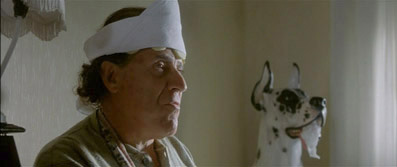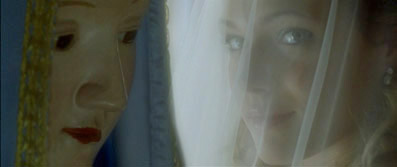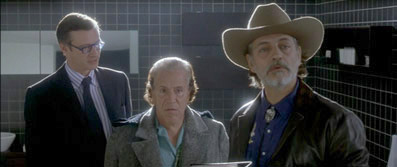| "Never
confuse the improbable with the impossible." |
| Geremia
De Geremei |
One of the unexpected high points of my 2005 cinema-going
was Paolo Sorrentino's The Consequences of Love [Le Conseguenze dell'amore]. It's not that
I wasn't expecting it to be good – we'd booked the 35mm
print for a cinema screening on the basis of some very positive reviews, despite the DVD already being available – it's just that
I wasn't expecting it to be that good. The story revolved
around a middle-aged Italian named Titta Di Girolamo, who
had spent ten years in the same Swiss hotel occupying the
same seat for his meals and waiting for who knows what – it may sound the stuff of minimalist drama, but Sorrentino's
handling was instantly beguiling and the friendship that
developed between Titta and a young, attractive hotel barmaid changed everything for the character and for the film
itself. If you haven't seen it, then it comes heartily recommended – it's available on UK DVD courtesy of Artificial Eye, and
it's they who have also brought to DVD Sorrentino's latest
and equally captivating work, The Family Friend [L'Amico di famiglia].

While
Titta Di Girolamo was emotionally cold but quietly intriguing,
the character at the centre of The Family Friend is defined largely by his sleazy self-interest – on my
regularly updated list of characters who don't have to be
likeable to be interesting, Geremia De Geremei must sit
somewhere near the top. A diminutive weasel of a man, Geremia
is a money lender who likes to believe that he is good-hearted. He certainly appears fond of the doubtless self-created nickname,
Geremia Heart-of-Gold, but if you're struggling with your
loan payments then this modern-day Shylock will have his
pound of flesh, possibly in sexual favours from your wife
or daughter. He spends precious little of the money he makes
on himself, sharing his dark, threadbare and leaky abode
with his ailing and housebound mother, while his miserly
greed is such that in spite of his income, he will happily steal
goods from a supermarket and then take a single candy to
the checkout and demand a discount on his loyalty card.
His more unsavoury attributes are summed up about a third
of the way in when he is described to a prospective customer
as "short-tempered, stingy, fake, vengeful, talkative.
And extremely hideous. He smells foul, he sweats profusely."
But
to reiterate the point above, Geremia may not be likeable,
but he most definitely is interesting. As played by Giacomo
Rizzo, whom director Sorrentino uncharitably (and perhaps
jokingly) describes in the accompanying interview as "the
ugliest actor in Italy, or one of the ugliest," he
has all the charm of a lizard that keeps trying to crawl
up your trouser leg, but as a screen character he is perversely
compelling. This really is a case of the actor finding the
inner humanity of a man who on the surface appears to have
none, and his moments of realisation and sadness for his
own life register beyond the obvious pleasure of a seeing
a harsh lesson learned by the deserving.
The
pursuit of money is not just Geremia's obsession, it is
his only doorway to human contact outside of his home. The
nearest he has to a friend – the easy-going, cowboy-dressing,
Country and Western obsessed Gino – is actually his assistant,
a man whose task it is to investigate potential borrowers
and gently lean on them if they misplace Geremia's trust
or fail to make payments. Geremia
likes to get personally involved with his clients, to become
the 'family friend' of the title. He is, the character who
provided that unflattering description above informs us,
"there when you need him, but also when you don't."
But his interest in the preparations for the wedding of
beautiful young Rosalba, funded by a loan that her proud father
can ill afford, are more personal. Bewitched by Rosalba's
beauty, Geremia uses a chance event on the wedding day to
take advantage of her, and a deal is struck to reduce her
father's loan repayments at considerable cost to her dignity.
But Geremia is not the only one captivated by Rosalba, and
could it be that she actually has genuine feelings for this
unpleasant lecher?

There's
an obvious whiff of Beauty and the Beast to the central narrative,
but the texturing, sub-stories and character detail ensure
that this is just one ingredient in a deliciously rich brew.
Other figures that enter the story may or may not have a
bearing on the turns Geremia's life and work could take,
from the man hoping to buy a title to secure a deal with
the Vatican ("I don't trust the Vatican," Geremia
tells him, "or God") to the business consortium
looking for a million Euro loan to upgrade their hotel chain
ahead of their competitors, a deal that seems designed to
engineer Geremia's downfall.
The
pace is upped from The Consequences of Love,
with Luca Bigazzi's energetic and smoothly mobile camera and consistently gorgeous use of light and the scope frame making
the most of some arresting minimalist architecture (one
of the few good things to come out of fascism, the director
informs us), which is joined at the hip to a seductively and sometimes
hauntingly employed source music soundtrack. Sorrentino's
love of Fellini films is evident in the sometimes
surrealistic comedy and effortlessly dream-like asides,
although two of the most memorable – a small army of citizens
carrying chairs down a main road and the three centurions
walking the night streets of Rome – turn out to have logical explanations, something I cannot provide for the
extraordinary opening shot involving a nun buried up to
her neck in sand.
To
call The Family Friend a quirky delight
does it a disservice, because it's a richer, more finely
tuned and more complex work than that accurate but simplistic
summing-up suggests. There's enough to delight cineastes
in the handling alone, with almost every shot having is
own compositional beauty, while the consistently effective
union of film and music is an object lesson in how to use
source tracks without turning your film into an extended
music video. But so much comes down to the central character
and Giacomo Rizzo's compelling performance, from his confidence
of his own world view to his comically hurried shuffle and
the swing of his ever-present plastic carrier bag. Rizzo
inhabits the character and makes him real, a core of truth
within the stylisation – he may not be easily likeable,
but you do, in spite of everything, feel for his fate.
When
Artificial Eye get it right they can really get
it right, and The Family Friend is one
such disc in every respect. The anamorphic 2.35:1 transfer
here strikes a fine balance between the bright greys and
whites of the architectural exteriors and the red tinted
gloom of the interior or Geremia's house at night. The detail
is well captured here – just compare the main feature with
the seriously inferior extracts included with the interview
in the extra features – but is still best viewed in a darkened
room. Colours are rich without over-saturation, and sharpness
and contrast are both very good. There is some minor artefacting
on on some areas of single colour, but it's visibility really
does depend on your player and monitor.

Dolby
2.0 stereo and Dolby surround 5.1 soundtracks are included
but there really is no contest here, the perfectly serviceable
stereo losing out to the handsomely recorded and mixed 5.1
track. Separation is precise and the surrounds are used
to engagingly inclusive effect. Particularly impressive
is the track's crystal clarity and dynamic range, something
it achieves without over-cranking the LFE bass.
Interview
with Paolo Sorrentino (30:53)
A not completely relaxed Sorrentino discusses a number of
aspects of the production, including how it came about,
working with lead actor Giacomo Rizzo and cinematographer
Luca Bigazzi, planning the shots and the music, the selection
of locations and architecture, and his love of subcultures.
It's all interesting stuff and has its memorable moments,
including the above-mentioned evaluation of Rizzo's looks.
Behind the Scenes Documentary (16:37)
A loosely structured collection of behind-the-scenes footage
covering a wide variety of scenes, but no interviews.
Behind
the Scenes Featurette 1 (3:14)
More of above, but with a brief interview with Rizzo about
the scene being filmed.
Behind the Scenes Featurette 2 (1:50)
Filming the C&W club scene, a brief and largely insubstantial
addition to the above.
Behind the Scenes Featurette 3 (4:49)
An EPK, which includes some crossover with behind-the-scenes
documentary above and some brief interview material.
Deleted/Alternate
Scenes (15:53)
A commentary-free collection of cut scenes and alternative
edits of existing scenes that's definitely worth catching,
not least for the extra character information provided,
including just how Geremia got that broken arm everyone
keeps asking about.
Alternate Love Scene (5:09)
A slightly more explicit cut of a key scene.
Alternate
Ending (6:45)
A very different ending to the one used in the film, and
a substantial sequence in its own right, this is a fascinating
inclusion that cannot be discussed in any detail without
spoiling the film for newcomers.
Italian
Trailer (1:42)
A brisk and effective sell that includes footage cut from
the release version.
UK
Trailer (2:06)
A really well edited trailer that would certainly have hooked
me in were I not already sold.
Stills
Gallery
12 stills from the film, nothing revelatory.
Filmographies
Full filmographies for Paolo Sorrentino and Laura Chiatti,
but only a selected one for Giacomo Rizzo.
I'll
admit to coming to The Family Friend with
high hopes after The Consequences of Love,
and I wasn't disappointed. If anything, the new film surpasses
the standard set by the earlier one, blending drama, pathos,
comedy, social commentary and gentle surrealism into a captivating
character study whose message for a society seemingly obsessed
with the acquisition of wealth is one worth spreading. Artificial
Eye have done the film proud here, with a fine anamorphic
transfer, an excellent soundtrack and a seriously impressive
set of extra features. Highly recommended.
|